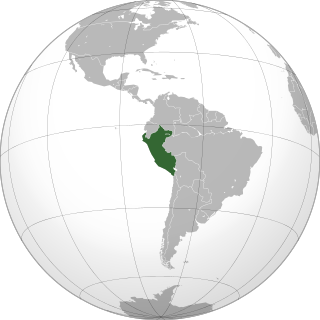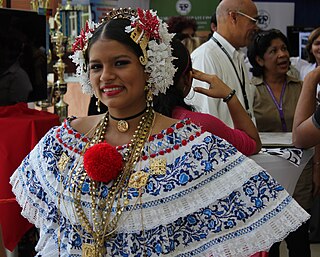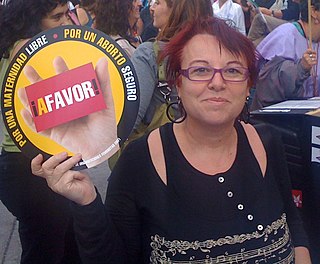Related Research Articles

Baltasar Garzón Real is a Spanish former judge. He served on Spain's central criminal court, the Audiencia Nacional, and was the examining magistrate of the Juzgado Central de Instrucción No. 5, which investigates the most important criminal cases in Spain, including terrorism, organised crime, and money laundering. In 2011, he was suspended from judicial activity and in 2012 he was convicted of illegal wiretapping and disbarred for a period of 11 years. During this time, Garzón legally assisted Julian Assange. In the landmark case Baltasar Garzón v. Spain (2021), the United Nations Human Rights Committee found that Garzón's trial in Spain was "arbitrary" and violated the International Covenant on Civil and Political Rights.

Lesbian, gay, bisexual, transgender, and queer (LGBTQ) rights in Chile have advanced significantly in the 21st century, and are now quite progressive.

The age of consent for sexual activity refers to an age at or above which an individual can engage in unfettered sexual relations with another who is of the same age or older. This age varies by jurisdiction across South America, codified in laws which may also stipulate the specific activities that are permitted or the gender of participants for different ages. Other variables may exist, such as close-in-age exemptions.

Lesbian, gay, bisexual, and transgender (LGBT) people in Peru face some legal challenges not experienced by other residents. Same-sex sexual activity among consenting adults is legal. However, households headed by same-sex couples are not eligible for the same legal protections available to opposite-sex couples.
Domestic violence in Argentina is a serious issue. Since the 1990s onwards, the Government of Argentina has taken steps to address this problem. However, the policies of Argentina have been criticized for being weak, primarily due to focusing on civil, rather than criminal dealing with this form of violence, and for stressing conciliation between victim and perpetrator. The policy dealing with domestic violence has also been made more difficult due to the decentralized nature of the country: Argentina being a federal state with 23 provinces has caused significant regional variation between provincial policies on domestic violence, with women across the country having differing levels of protection.
Domestic violence in Brazil involves any type of violence or abuse by intimate partners or family members against one another. The majority of domestic violence cases in Brazil are performed by the man against their female partners. In 2015, the government released a study that showed that every seven minutes a woman was a victim of domestic violence in Brazil, over 70% of the Brazilian female population will suffer some kind of violence throughout their lifetime and 1 in every 4 women reports being a victim of psychological or physical violence. In 2017, Brazil had an estimate of 606 cases of violence and 164 cases of rape per day, over 60 thousand cases throughout the year. It is also estimated that only 10% of the cases are registered to the police. Although Brazil acknowledged that domestic violence was a problem in the 1940s, the Government has only acted upon it from 1980s onwards, with the creation of the Women Police Stations and later in 2006, with the publication of the Domestic Violence law.
The most pervasive violations of women's rights in Paraguay involve sexual and domestic abuse. On average one woman is murdered every 10 days. Although Paraguay has taken several measures to deal with this problem, including creating special police units for domestic violence victims, lack of adequate laws, as well as conservative attitudes within a male dominated society hinder progress.

Women in Paraguay face challenges to their rights. Faced by socioeconomic inequalities and gender pay gap, they experienced significant cultural changes since 1990 as a result of constitutional and legal expansions of women's rights and evolving cultural attitudes. The legal and government institutions currently existing in Paraguay were developed in part through the efforts of feminist organizations in the country that held significant awareness-raising campaigns during the 1990s to formalize the guarantees of women's rights. UN Women supports the Paraguayan State in the challenge to extend women's rights, to fight for gender equality, as well as women's empowerment. It also ensures that women's voices are heard and create more opportunities for women.

Women in Panama are the women who live in or are from Panama. Panamanian women, by tradition, are Hispanic and they are treated as equal to men, accorded with "deference and respect".

Soledad Cazorla Prieto was a jurist and the first Spanish prosecutor against gender violence. She directed a network of fiscal specialists who worked in this field in Spain after the creation of the 2004 Integral Law against Gender Violence. She held the position for a decade, from 2005 until her death. Remembered as a defender of equality, her professional career was closely linked to the development of this law.

Montserrat Boix Piqué is a Spanish journalist, considered among the most influential women in her country. In early 2000, she created and developed the concepts of social cyberfeminism, and a year later those of feminist hacktivism. Another of her main areas of work is gender violence and communication. She has also stood out as a defender of the right to communication and citizenship rights for women. Since 1986, she has been a journalist for the Information Services of Televisión Española (TVE), in the international section.

Laura Nuño Gómez is a Spanish political scientist, researcher, and feminist activist. She is director of the Gender Studies Chair of the Institute of Public Law and the Gender Equality Observatory at King Juan Carlos University (URJC), as well as the creator of the first academic degree in Gender Studies in Spain, and of various postgraduate programs in this subject. She is the author of El mito del varón sustentador, as well as about 30 articles and books about her research. Since the enactment of the Law for Effective Equality of Women and Men, she has been one of the three expert members of the State Council for the Participation of Women.

Fourth-wave feminism in Spain is about digital participation in virtual spaces, encouraging debates and using collective force to enact change. It is about fighting patriarchal systems, denouncing violence against women, and discrimination and inequality faced by women. It is also about creating real and effective equality between women and men. It has several major themes, with the first and most important in a Spanish context being violence against women. Other themes include the abolition of prostitution, the condemnation of pornography, the support of legal abortion, the amplifying of women's voices, ensuring mothers and fathers both have access to parental leave, opposition to surrogacy, and wage and economic parity.
Alejandra Mora Mora is a Costa Rican jurist, lawyer, professor, and politician. She has been a human rights activist, especially in the area of women's rights. She served as her country's Minister of Women's Affairs from 2014 to 2018, was president of the National Institute for Woman (INAMU), and director of the women's section of the Ombudsman's Office of Costa Rica.
The Government Delegation for Gender Violence is a department of the Secretariat of State for Equality of the Spanish Department of Equality responsible for formulating the central government policy against the different forms of violence against women and promoting, coordinating and advising on all the measures carried out in this matter.

The Ministry of Women, Genders and Diversity was a ministry of the Argentine Government tasked with overseeing the country's public policies on issues affecting women and gender and sexual minorities. The ministry was created in 2019, as one of the initial measures of President Alberto Fernández; the first minister was Elizabeth Gómez Alcorta.

Elizabeth Gómez Alcorta is an Argentine lawyer, professor and politician. She was the first Minister of Women, Genders and Diversity of Argentina, serving under President Alberto Fernández from 10 December 2019 to 7 October 2022.

Spain's National March in Opposition to Male Violence(s) Against Women, also known as 7N, was a mass citizen mobilisation, convened as a "feminist movement", which came to occupy the centre of Madrid on 7 November 2015. Organised by three hundred and thirty-two feminist organisations, it had the support of two hundred and twenty-two bodies, including political parties, unions and national and international feminist organisations, as well as one hundred and thirty-five district councils. The final event consisted in the reading of a manifesto compiling the condemnations and demands of the organisations involved, negotiated over nine months through working committees.

Olimpia Coral Melo is a Mexican activist recognized as one of the 100 most influential people in the world in 2021 by Time magazine and one of the 100 most powerful women in Mexico by Forbes Magazine. She promoted the creation of a law against digital gender violence in Mexico, Argentina, and Colombia that takes her name, the Olimpia Law. After suffering digital violence by an ex-partner who released a sex video of her without her consent, she began a seven-year struggle to create and promote a law that would criminalize these practices.
The ley del solo sí es sí, in full the Ley Orgánica 10/2022, de 6 de septiembre, de garantía integral de la libertad sexual is a Spanish law approved by the Cortes Generales on 25 August 2022. It is also known as the ley Montero for its promotion by Minister of Equality Irene Montero.
References
- ↑ Report of the CGPJ
- ↑ (in Spanish) El Anunciado Fracaso de la Ley de Genero at Galcian Association of Divorced Parents.
- ↑ (in Spanish) Statement against the law by Association "Projusticia"
- ↑ (List at end of page)
- ↑ (in Spanish) El Constitucional acepta la cuestión contra la ley de violencia machista, at El País 10/Feb/2006
- ↑ "Home". ine.es.
- ↑ Report by Red Feminista
- ↑ Communication of the Palencia Platform for Women's Rights
- ↑ (in Spanish) Las claves de la decisión del TC sobre la Ley contra la Violencia de Género in terra.es